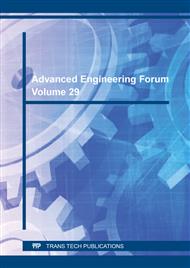p.1
p.12
p.19
p.26
p.34
p.46
p.57
p.62
p.67
The Fuzzy Comprehensive Evaluation of the Self-Conditioning of Hydrophilic Fixed-Abrasive Pad
Abstract:
The self-conditioning of hydrophilic fixed abrasive lapping based on the principle of two-body (pad-wafer) abrasion has great importance on the MRR (material removal rate) of wafer. The physical and mechanical properties of pad were taken as set of available alternatives. Fuzzy comprehensive evaluation principle was applied to establish a model for the self-conditioning of FAP. The swelling ratio, the slurry abrasive ratio and pendulum hardness were selected to be the set of alternatives for self-conditioning evaluations in this paper .The five types of matrix formations of fixed-abrasive pad were prepared, and the matrix were ranked in order of comprehensive evaluation index. The results show that the fuzzy evaluation is rational. The tests of MRR verified the self-conditioning of FAP. The machining of pad can be evaluated in advance of lapping processes. Moreover, the self-conditioning evaluation will be important reference for determination of FAP during choosing the matrix formations.
Info:
Periodical:
Pages:
26-33
DOI:
Citation:
Online since:
August 2018
Authors:
Price:
Сopyright:
© 2018 Trans Tech Publications Ltd. All Rights Reserved
Share:
Citation:


